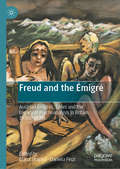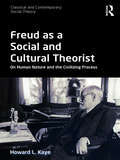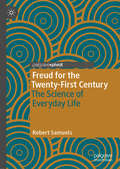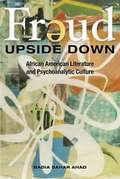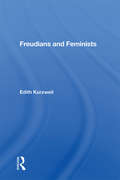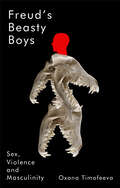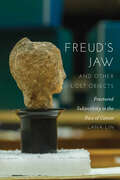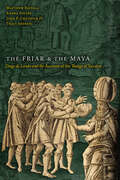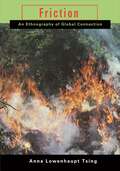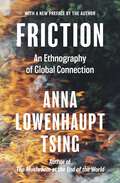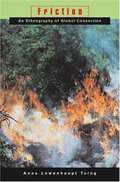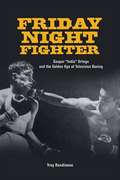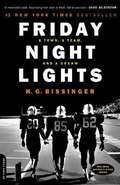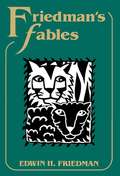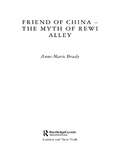- Table View
- List View
Freud and Said: Contrapuntal Psychoanalysis as Liberation Praxis (Palgrave Studies in the Theory and History of Psychology)
by Robert K. BesharaThis book examines the theoretical links between Edward W. Said and Sigmund Freud as well the relationship between psychoanalysis, postcolonialism and decoloniality more broadly. The author begins by offering a comprehensive review of the literature on psychoanalysis and postcolonialism, which is contextualized within the apparatus of racialized capitalism. In the close analysis of the interconnections between the Freud and Said that follows, there is an attempt to decolonize the former and psychoanalyze the latter. He argues that decolonizing Freud does not mean canceling him; rather, he employs Freud’s sharpest insights for our time, by extending his critique of modernity to coloniality. It is also advanced that psychoanalyzing Said does not mean psychologizing the man; instead the book's aim is to demonstrate the influence of psychoanalysis on Said’s work. It is asserted that Said began with Freud, repressed him, and then Freud returned. Reading Freud and Said side by side allows for the theorization of what the author calls contrapuntal psychoanalysis as liberation praxis, which is discussed in-depth in the final chapters.This book, which builds on the author’s previous work, Decolonial Psychoanalysis, will be a valuable text to scholars and students from across the psychology discipline with an interest in Freud, Said and the broader relationship between psychoanalysis and colonialism.
Freud and the Émigré: Austrian Émigrés, Exiles and the Legacy of Psychoanalysis in Britain, 1930s–1970s
by Elana Shapira Daniela FinziThis book reconsiders standard narratives regarding Austrian émigrés and exiles to Britain by addressing the seminal role of Sigmund Freud and his writings, and the critical part played by his contemporaries, in the construction of a method promoting humanized relations between individual and society and subjectivity and culture. This anthology presents groundbreaking examples of the manners in which well-known personalities including psychoanalysts Anna Freud and Ernst Kris, sociologist Marie Jahoda, authors Stefan Zweig and Hilde Spiel, film director Berthold Viertel, architect Ernst Freud, and artist Oskar Kokoschka, achieved a greater impact, and contributed to the broadening of British and global cultures, through constructing a psychologically effective language and activating their émigré networks. They advanced a visionary Viennese tradition through political and social engagements and through promoting humanistic perspectives in their scientific, educational and artistic works.
Freud as a Social and Cultural Theorist: On Human Nature and the Civilizing Process (Classical and Contemporary Social Theory)
by Howard L. KayeThis book offers a new account of Freud’s work by reading him as the social theorist and philosopher he always aspired to be, and not as the medical scientist he publicly claimed to be. In doing so, the author demonstrates that’s Freud’s social, moral, and cultural thought constitutes the core of his life’s work as a theorist, and is the thread that binds his voluminous writings together: from his earliest essays on the neuroses, to his foundational writings on dreams and sexuality, and to his far-ranging reflections on art, religion, and the dynamics of culture. Returning to the fundamental questions and concerns that animate Freud’s work - the nature of evil; the origins of religion, morality, and tradition; and the looming threat of resurgent barbarism - Freud as a Social and Cultural Theorist provides the first systematic re-examination of Freud’s social and cultural thought in more than a generation. As such, it will be of interest to social and cultural theorists, social philosophers, intellectual and cultural historians, and those with interests in psychoanalysis and its origins.
Freud for the Twenty-First Century: The Science of Everyday Life
by Robert SamuelsThis book places Freud’s theory of the reality principle in relation to both everyday experience and global issues of the 21st century and illustrates how it may be practically applied. Arguing against more critical recent accounts of Freud’s science, the author seeks to show how one might apply the scientific method to everyday life. It demonstrates how Freud contributes to a better understanding of reason and how this in turn can be used to unravel the role of unreason in both politics and personal relationships. Including critical examinations of topics such as Narcissism, Victimhood and Empathy, this engaging reappraisal of Freud’s relevance to contemporary life offers fresh insights for psychology, psychoanalysis and cultural theory; as well as practical guidance for a general reader.
Freud in Oz: At the Intersections of Psychoanalysis and Children’s Literature
by Kenneth B. KiddChildren&’s literature has spent decades on the psychiatrist&’s couch, submitting to psychoanalysis by scores of scholars and popular writers alike. Freud in Oz turns the tables, suggesting that psychoanalysts owe a significant and largely unacknowledged debt to books ostensibly written for children. In fact, Kenneth B. Kidd argues, children&’s literature and psychoanalysis have influenced and interacted with each other since Freud published his first case studies.In Freud in Oz, Kidd shows how psychoanalysis developed in part through its engagement with children&’s literature, which it used to articulate and dramatize its themes and methods, turning first to folklore and fairy tales, then to materials from psychoanalysis of children, and thence to children&’s literary texts, especially such classic fantasies as Peter Pan and Alice&’s Adventures in Wonderland. He traces how children&’s literature, and critical response to it, aided the popularization of psychoanalytic theory. With increasing acceptance of psychoanalysis came two new genres of children&’s literature—known today as picture books and young adult novels—that were frequently fashioned as psychological in their forms and functions.Freud in Oz offers a history of reigning theories in the study of children&’s literature and psychoanalysis, providing fresh insights on a diversity of topics, including the view that Maurice Sendak and Bruno Bettelheim can be thought of as rivals, that Sendak&’s makeover of monstrosity helped lead to the likes of the Muppets, and that &“Poohology&” is its own kind of literary criticism—serving up Winnie the Pooh as the poster bear for theorists of widely varying stripes.
Freud Upside Down
by Badia Sahar AhadThis thought-provoking cultural history explores how psychoanalytic theories shaped the works of important African American literary figures. Badia Sahar Ahad details how Nella Larsen, Richard Wright, Jean Toomer, Ralph Ellison, Adrienne Kennedy, and Danzy Senna employed psychoanalytic terms and conceptual models to challenge notions of race and racism in twentieth-century America. Freud Upside Down explores the relationship between these authors and intellectuals and the psychoanalytic movement emerging in the United States over the course of the twentieth century. Examining how psychoanalysis has functioned as a cultural phenomenon within African American literary intellectual communities since the 1920s, Ahad lays out the historiography of the intersections between African American literature and psychoanalysis and considers the creative approaches of African American writers to psychological thought in their work and their personal lives.
Freudians And Feminists
by Edith KurzweilThis book traces the intellectual history of the interaction between feminists and Freudian thought, charting the essence of psychoanalytic theories through the years to show specific notions were adapted, readapted, and discarded by successive generations of feminists.
Freud's Beasty Boys: Sex, Violence and Masculinity
by Oxana TimofeevaThis book examines violence and sexuality after Freud. Its characters, though, are not women and men, but rather animals and children. Focusing on three famous Freudian cases in which little boys had issues with animals – Little Hans, The Rat Man, and the Wolf Man – it revises the role played by animals in male gender socialization. Timofeeva demonstrates the relevance of psychoanalysis for anyone who wants to understand how patriarchy works, but she also points to its limitations. For Freud, sexuality creates the background of our psychic lives, and unconscious sexual fantasies are the origins of psychic disorders such as hysteria, obsessions and phobias. But what are the origins of sexual fantasies? Timofeeva argues that behind psychic dramas of sexuality there is something else: a mechanism of violence which she calls ‘the machine of masculinity’ and which she analyses both through Freud’s cases and through the lens of religion, anthropology and her own life experiences. Wolves, rats and horses are magical agents that connect us to the world of the dead – that is, to the history of our culture in which monotheism replaced totemic practices but the basic psychosocial matrix of turning love into violence continues to reproduce itself.
Freud's Jaw and Other Lost Objects: Fractured Subjectivity in the Face of Cancer
by Lana LinWhat does it mean to live with life-threatening illness? How does one respond to loss? Freud’s Jaw and Other Lost Objects attempts to answer these questions and, as such, illuminates the vulnerabilities of the human body and how human beings suffer harm. In particular, it examines how cancer disrupts feelings of bodily integrity and agency. Employing psychoanalytic theory and literary analysis, Lana Lin tracks three exemplary figures, psychoanalyst Sigmund Freud, poet Audre Lorde, and literary and queer theorist Eve Kosofsky Sedgwick. Freud’s sixteen-year ordeal with a prosthetic jaw, the result of oral cancer, demonstrates the powers and failures of prosthetic objects in warding off physical and psychic fragmentation. Lorde’s life writing reveals how losing a breast to cancer is experienced as yet another attack directed toward her racially and sexually vilified body. Sedgwick’s memoir and breast cancer advice column negotiate her morbidity by disseminating a public discourse of love and pedagogy. Lin concludes with an analysis of reparative efforts at the rival Freud Museums in London and Vienna. The disassembled Freudian archive, like the subjectivities-in-dissolution upon which the book focuses, shows how the labor of integration is tethered to persistent discontinuities.Freud’s Jaw asks what are the psychic effects of surviving in proximity to one’s mortality, and it suggests that violences stemming from social, cultural, and biological environments condition the burden of such injury. Drawing on psychoanalyst Melanie Klein’s concept of “reparation,” wherein constructive forces are harnessed to repair damage to internal psychic objects, Lin proposes that the prospect of imminent destruction paradoxically incites creativity. The afflicted are obliged to devise means to reinstate, at least temporarily, their destabilized physical and psychic unity through creative, reparative projects of love and writing.
Freundschaft oder Kollegialität?: Freundschaftsanbahnung in Organisationen als Kommunikationsproblem (Organisationsstudien)
by Harms HerbertBereits ein wenig Organisationserfahrung lehrt: Am Arbeitsplatz wird nicht nur gearbeitet. Angesichts der Allgegenwärtigkeit persönlicher Beziehungen fällt jedoch der Mangel an theoretisch trennscharfen und empirisch angemessenen Beschreibungen auf. Der Band schließt diese Lücke anhand eines differenzierungstheoretischen Vorgehens, wodurch Kollegialität und Freundschaft als distinkte soziale Ordnungen sichtbar werden: Kollegen erwarten wie Vorgesetzte lediglich konformes Handeln. Ob man die Anweisung tatsächlich gerne ausführt oder ob man dem Kollegen wirklich von Herzen zum Geburtstag gratuliert, kann hingegen nicht legitimerweise eingefordert werden. Im Unterschied dazu erwarten Freunde eine Kongruenz von Handeln und Erleben und dürfen daran auch im Enttäuschungsfall festhalten. Mit Hilfe der zugrundeliegenden Begriffsarbeit wird Freundschaft identifizierbar als (zu) anspruchsvolle Kommunikationsform, die vielfältig zum Problem werden kann — nicht nur für die Organisation, sondern auch für die (vermeintlichen) Freunde. Die Studie fokussiert hierzu auf das Problem der Freundschaftsanbahnung aus der Sicht eines Mitglieds und beantwortet die Frage, welchen Unterschied es macht, wenn die Anbahnung in einem formalen Kontext statt findet. Anhand vielfältiger und detaillierter Sekundäranalysen wird herausgearbeitet, wie die formale Ordnung die Zurechnung auf Kollegialität strukturell nahelegt, ohne Freundschaft damit auszuschließen. Damit liefert die Studie einen spannenden Blick auf ein bisher vernachlässigtes Thema, das gerade auch für Praktiker relevant ist.
Freundschaftsnetzwerke und Delinquenz von Jugendlichen: Eine empirische Untersuchung mit Methoden der Sozialen Netzwerkanalyse (Kriminalität und Gesellschaft)
by Dominik GerstnerDominik Gerstner beschäftigt sich mit der Bedeutung von Gleichaltrigen bzw. Peer-Beziehungen für die Entstehung und Bewertung von abweichendem Verhalten im Jugendalter und damit mit einem klassischen Thema der Kriminalsoziologie. Durch die Anwendung innovativer Theorien – wie z.B. der Situational Action Theory – und dem methodischen Ansatz der Netzwerkanalyse werden dieser Thematik neue Impulse gegeben. Im Zentrum der vorliegenden Arbeit stehen Analysen quantitativer Daten, in denen Einflüsse der Freunde in der Schulklasse auf das delinquente Verhalten von Jugendlichen sowie die Bedeutung dieses Verhaltens für die Popularität in Schulklassen untersucht wird. Die empirischen Auswertungen basieren auf den Daten der MPI-Schulbefragung 2011, die in zwei deutschen Großstädten durchgeführt wurde.
The Friar and the Maya: Diego de Landa and the Account of the Things of Yucatan
by Matthew Restall Amara Solari John F. Chuchiak Traci ArdrenThe Friar and the Maya offers a full study and new translation of the Relación de las Cosas de Yucatán (Account of the Things of Yucatan) by a unique set of eminent scholars, created by them over more than a decade from the original manuscript held by the Real Academia de la Historia in Madrid. This critical and careful reading of the Account is long overdue in Maya studies and will forever change how this seminal text is understood and used. For generations, scholars used (and misused) the Account as the sole eyewitness insight into an ancient civilization. It is credited to the sixteenth-century Spanish Franciscan, monastic inquisitor, and bishop Diego de Landa, whose legacy is complex and contested. His extensive writings on Maya culture and history were lost in the seventeenth century, save for the fragment that is the Account, discovered in the nineteenth century, and accorded near-biblical status in the twentieth as the first “ethnography” of the Maya. However, the Account is not authored by Landa alone; it is a compilation of excerpts, many from writings by other Spaniards—a significant revelation made here for the first time. This new translation accurately reflects the style and vocabulary of the original manuscript. It is augmented by a monograph—comprising an introductory chapter, seven essays, and hundreds of notes—that describes, explains, and analyzes the life and times of Diego de Landa, the Account, and the role it has played in the development of modern Maya studies. The Friar and the Maya is an innovative presentation on an important and previously misunderstood primary source.
Friction: An Ethnography of Global Connection
by Anna Lowenhaupt TsingWhat the struggle over the Indonesian rainforests can teach us about the social frictions that shape the world around usRubbing two sticks together produces heat and light while one stick alone is just a stick. It is the friction that produces movement, action, and effect. Anthropologist Anna Lowenhaupt Tsing challenges the widespread view that globalization invariably signifies a clash of cultures, developing friction as a metaphor for the diverse and conflicting social interactions that make up our contemporary world.Tsing focuses on the rainforests of Indonesia, where in the 1980s and 1990s capitalist interests increasingly reshaped the landscape not so much through corporate design as through awkward chains of legal and illegal entrepreneurs that wrested the land from previous claimants, creating resources for distant markets. In response, environmental movements arose to defend the rainforests and the communities of people who live in them. Not confined to a village, province, or nation, the social drama of the Indonesian rainforests includes local and national environmentalists, international science, North American investors, advocates for Brazilian rubber tappers, United Nations funding agencies, mountaineers, village elders, and urban students—all drawn into unpredictable, messy misunderstandings, but misunderstandings that sometimes work out.Providing an invaluable portfolio of methods for the study of global interconnections, Friction shows how cultural differences are in the grip of worldly encounter and reveals how much is overlooked in contemporary theories of the global.
Friction: An Ethnography of Global Connection
by Anna Lowenhaupt TsingWhat the struggle over the Indonesian rainforests can teach us about the social frictions that shape the world around usRubbing two sticks together produces heat and light while one stick alone is just a stick. It is the friction that produces movement, action, and effect. Anthropologist Anna Lowenhaupt Tsing challenges the widespread view that globalization invariably signifies a clash of cultures, developing friction as a metaphor for the diverse and conflicting social interactions that make up our contemporary world.Tsing focuses on the rainforests of Indonesia, where in the 1980s and 1990s capitalist interests increasingly reshaped the landscape not so much through corporate design as through awkward chains of legal and illegal entrepreneurs that wrested the land from previous claimants, creating resources for distant markets. In response, environmental movements arose to defend the rainforests and the communities of people who live in them. Not confined to a village, province, or nation, the social drama of the Indonesian rainforests includes local and national environmentalists, international science, North American investors, advocates for Brazilian rubber tappers, United Nations funding agencies, mountaineers, village elders, and urban students—all drawn into unpredictable, messy misunderstandings, but misunderstandings that sometimes work out.Providing an invaluable portfolio of methods for the study of global interconnections, Friction shows how cultural differences are in the grip of worldly encounter and reveals how much is overlooked in contemporary theories of the global.
Friction: An Ethnography of Global Connection
by Anna Lowenhaupt TsingA wheel turns because of its encounter with the surface of the road; spinning in the air it goes nowhere. Rubbing two sticks together produces heat and light; one stick alone is just a stick. In both cases, it is friction that produces movement, action, effect. Challenging the widespread view that globalization invariably signifies a "clash" of cultures, anthropologist Anna Tsing here develops friction in its place as a metaphor for the diverse and conflicting social interactions that make up our contemporary world. She focuses on one particular "zone of awkward engagement"--the rainforests of Indonesia--where in the 1980s and the 1990s capitalist interests increasingly reshaped the landscape not so much through corporate design as through awkward chains of legal and illegal entrepreneurs that wrested the land from previous claimants, creating resources for distant markets. In response, environmental movements arose to defend the rainforests and the communities of people who live in them. Not confined to a village, a province, or a nation, the social drama of the Indonesian rainforest includes local and national environmentalists, international science, North American investors, advocates for Brazilian rubber tappers, UN funding agencies, mountaineers, village elders, and urban students, among others--all combining in unpredictable, messy misunderstandings, but misunderstandings that sometimes work out. Providing a portfolio of methods to study global interconnections, Tsing shows how curious and creative cultural differences are in the grip of worldly encounter, and how much is overlooked in contemporary theories of the global.
Friday Night Fighter: Gaspar "Indio" Ortega and the Golden Age of Television Boxing
by Troy RondinoneFriday Night Fighter relives a lost moment in American postwar history, when boxing ruled as one of the nation's most widely televised sports. During the 1950s and 1960s, viewers tuned in weekly, sometimes even daily, to watch widely-recognized fighters engage in primordial battle, with the Gillette Cavalcade of Sports Friday Night Fights being the most popular fight show. Troy Rondinone follows the dual narratives of the Friday Night Fights show and the individual story of Gaspar "Indio" Ortega, a boxer who appeared on primetime network television more than almost any other boxer in history. From humble beginnings growing up poor in Tijuana, Mexico, Ortega personified the phenomenon of postwar boxing at its greatest, appearing before audiences of millions to battle the biggest names of the time, such as Carmen Basilio, Tony DeMarco, Chico Vejar, Benny "Kid" Paret, Emile Griffith, Kid Gavilan, Florentino Fernández, and Luis Manuel Rodriguez. Rondinone explores the factors contributing to the success of televised boxing, including the rise of television entertainment, the role of a "reality" blood sport, Cold War masculinity, changing attitudes toward race in America, and the influence of organized crime. At times evoking the drama and spectacle of the Friday Night Fights themselves, this volume is a lively examination of a time in history when Americans crowded around their sets to watch the main event.
Friday Night Lights: A Town, a Team, and a Dream
by H. G. BissingerThe classic, best-selling story of life in the football-driven town of Odessa, Texas, includes a new afterword that looks at the players and the town 10 years later.
Fried Chicken
by John T. EdgeWhat could be a more fun and delicious way to celebrate American culture than through the lore of our favorite foods? That's what John T. Edge does in his smart, witty, and compulsively readable new series on the dishes everyone thinks their mom made best. If these are the best-loved American foods-ones so popular they've come to represent us-what does that tell us about ourselves? And what do the history of the dish and the regional variations reveal? There are few aspects of life that carry more emotional weight and symbolism than food, and in writing about our food icons, Edge gives us a warm and wonderful portrait of America -by way of our taste buds. After all, "What is patriotism, but nostalgia for the foods of our youth?" as a Chinese philosopher once asked. In Fried Chicken, Edge tells an immensely entertaining tale of a beloved dish with a rich history. Freed slaves cooked it to sell through the windows of train cars from railroad platforms in whistle-stop towns. Children carried it in shoe boxes on long journeys. A picnic basket isn't complete without it. It is a dish that is deeply Southern, and yet it is cooked passionately across the country. And what about the variations? John T. Edge weaves a beguiling tapestry of food and culture as he takes us from a Jersey Shore hotel to a Kansas City roadhouse, from the original Buffalo wings to KFC, from Nashville Hot Chicken to haute fried chicken at a genteel Southern inn. And, best of all, he gives us fifteen of the ultimate recipes along the way.
Fried Chicken
by John T. EdgeThis immensely entertaining book on fried chicken takes us from Memphis to Manhattan, from plantation kitchens to KFC. Author John Edge investigates the origins and significance of the dish in our culture, on a wild ride through the kitchens of some highly colorful characters, and emerges with not only an unforgettable portrait of America by way of our bellies, but also recipes for 15 of the best regional variations on the classic dish. "Edge is pure fun -- with his great sense of humor, insatiable enthusiasm, original insights, and careful commentary, he's one of the world's best companions. "
Friedman's Fables
by Edwin H. FriedmanDr. Friedman has woven 24 illustrative tales that offer fresh perspectives on familiar human foibles and reflect the author's humor, pathos, and understanding. Friedman takes on resistance and other "demons" to show that neither insight, nor encouragement, nor intimidation can in themselves motivate an unmotivated person to change. These tales playfully demonstrate that new ideas, new questions, and imagination, more than accepted wisdom, provide each of us with the keys to overcoming stubborn emotional barriers and facilitating real change both in ourselves and others. Thought-provoking discussion questions for each fable are included.
Friedman's Fables (with Booklet)
by Edwin H. FriedmanDr. Friedman has woven 24 illustrative tales that offer fresh perspectives on familiar human foibles and reflect the author's humor, pathos, and understanding. Friedman takes on resistance and other "demons" to show that neither insight, nor encouragement, nor intimidation can in themselves motivate an unmotivated person to change. These provocative tales playfully demonstrate that new ideas, new questions, and imagination, more than accepted wisdom, provide each of us with the keys to overcoming stubborn emotional barriers and facilitating real change both in ourselves and others. Sure to intrigue and inform, this book belongs in the resource library of public speakers, teachers, trainers, and clergy, as well as general readers.
Friedrich Engels – Eine Biographie 1: Band 1: Friedrich Engels in seiner Frühzeit – Herausgegeben und eingeleitet von Stephan Moebius (Klassiker der Sozialwissenschaften)
by Gustav MayerDie hier wieder zugänglich gemachte zweibändige Biographie Friedrich Engels‘ von Gustav Mayer gilt bis heute als bedeutendes Standardwerk. Neu herausgegeben und eingeleitet von Stephan Moebius.
Friedrich Engels – Eine Biographie 2: Band 2: Friedrich Engels und der Aufstieg der Arbeiterbewegung in Europa (Klassiker der Sozialwissenschaften)
by Gustav MayerDie hier wieder zugänglich gemachte zweibändige Biographie Friedrich Engels‘ von Gustav Mayer gilt bis heute als bedeutendes Standardwerk. Neu herausgegeben von Stephan Moebius.
Friedrich Kittler. Neue Lektüren
by Jens Schröter Till A. HeilmannDer Band präsentiert neue Lektüren zu grundlegenden Schriften von Friedrich Kittler. Die Mitte der 1980er Jahre publizierten Monographien Aufschreibesysteme 1800 / 1900 und Grammophon, Film, Typewriter waren ein entscheidender Beitrag zur Institutionalisierung der Medienwissenschaft im deutschsprachigen Raum. Heute wird Kittlers Werk auch international breit rezipiert, und mehr und andere Medien bestimmen unsere Lage. Vor diesem Hintergrund befragen die Autorinnen und Autoren des Bandes ausgewählte Texte Kittlers hinsichtlich einer Analyse und Kritik der Medien auf der Höhe der Zeit.
Friend of China - The Myth of Rewi Alley: The Myth Of Rewi Alley (Chinese Worlds)
by Anne-Marie BradyThis study is a radical and controversial analysis of the life and works of Rewi Alley utilizing both Chinese materials and previously unpublished materials from western sources. Rather than a biography as such, it is a revisionist history, re-examining what we know and understand about one of the most famous, or indeed infamous, foreigners in modern China: Rewi Alley, who arrived in China in 1927 from New Zealand and lived there for the rest of his life. Alley was regarded as a great humanitarian and internationalist. Later he became an outspoken 'foreign friend' of the Chinese regime and prolific propagandist on the new China. This book examines the myth and reality of his life, using them to explore the role of foreigners in China's diplomatic relations and their sensitive place in China after 1949, laying bare the important role of China's 'foreign friends' in Chinese foreign policy.

